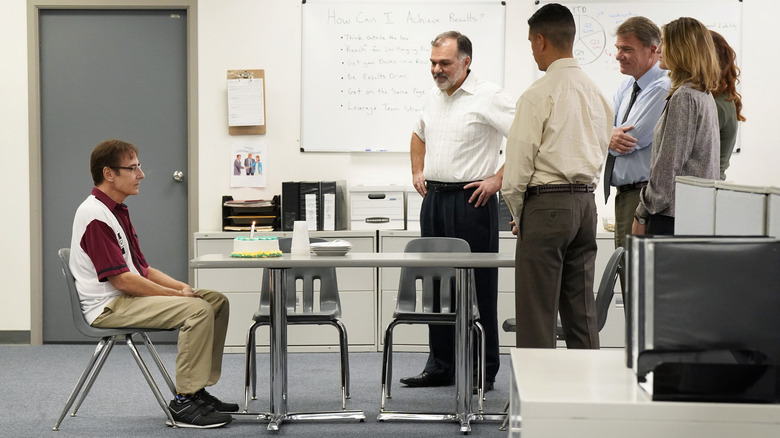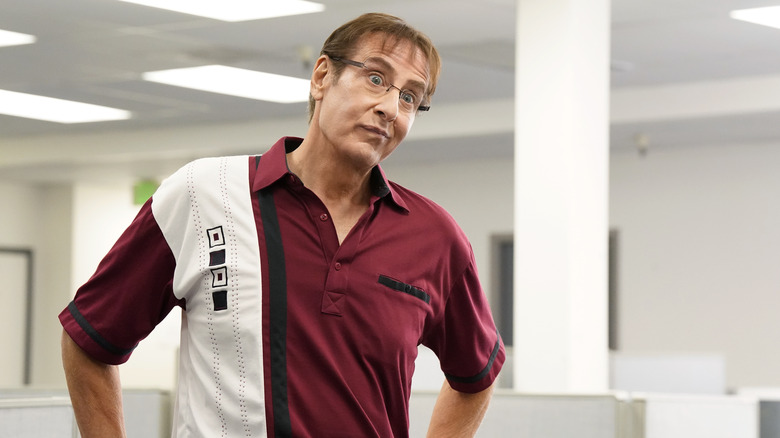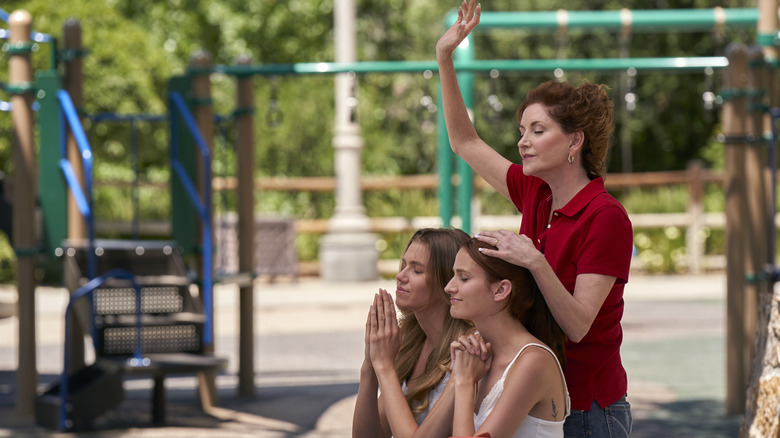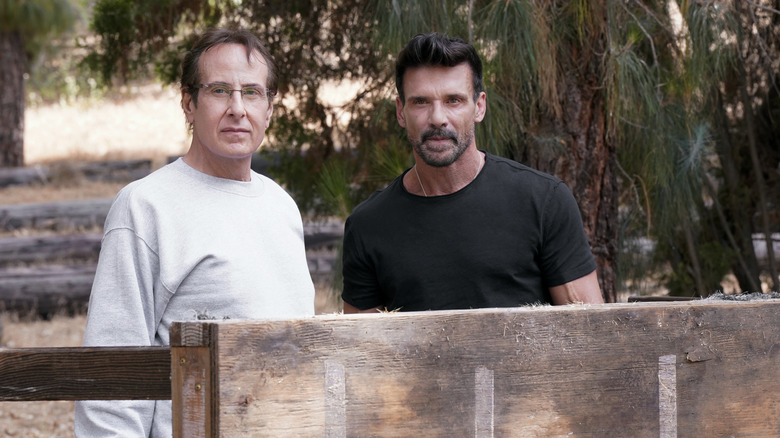Paul T. Goldman Director Jason Woliner On That Wild Finale [Exclusive Interview]
This post contains spoilers for "Paul T. Goldman."
For the first five episodes of Peacock's oddball, uber-meta comedy series "Paul T. Goldman," director Jason Woliner grabs the audience by the hand and guides them into the kooky world of the title character — a world that's similar to our own, but heightened. Paul, a nebbish middle-aged man, has concocted an elaborate reality in which his ex-wife is a madam who has teamed up with a pimp to oversee a prostitution ring, and Paul envisions himself the hero who brings down their international sex trafficking syndicate. For the ten years that this project has been in the works, Woliner let Paul essentially steer the ship, and the director has facilitated fictionalized reenactments of scenes from Paul's screenplays based on these "true" life events in order to help immerse the audience in Paul's headspace and let us see how he sees the world.
In the sixth and finale episode, though, the complicated facade all comes crashing down. Paul is confronted with hard facts that disprove his harebrained theories, and the episode features an emotional confrontation in which he's actually forced to reckon with the real world for what feels like the first time in years. It all makes for compelling television, and I'm personally glad that Woliner envisioned the show ending this way, because there's a genuine catharsis to seeing Paul face reality in this way. But while the show is often very funny, and cringy, and jaw-dropping, and deeply strange, there's also a sadness to it, and I was happy to have the opportunity to reconnect with Woliner to talk about the series finale, how his own feelings about Paul evolved over the course of making this show, and much more.
Note: This interview has been lightly edited for clarity and brevity.
'I always wanted the release of the show to be part of the ending of the show'
Tell me about the last stretch of production for you. The final episode includes footage from the premiere, so you were clearly laying down the train tracks right before the train ran over them.
I absolutely was. I always wanted the release of the show to be part of the ending of the show. I thought that would be interesting. And also showing Paul the show, and Paul stepping out into the world. So we had to figure out a way to be editing and delivering the other episodes, editing the finale while putting on this premiere and film him watching a billboard go up or be watching focus groups. All this stuff I knew had to happen for the very end. And we just had to schedule the edit so that we finished most of the editing right before that premiere. We probably had a week more left. But then we threw the premiere in over two days. We had to cut that footage, and then we still had a little gap at the end because I wanted a little bit of the last episode to be from after the show came out, where he's seeing the reaction to it. That was the same day that he was on Jimmy Kimmel, and I was hoping we'd get a moment to use from that. So yeah, it was always the intention, so it was just a mad scramble at the end and finish everything and get it out there.
The moment with you and Paul off to the side of the stage, after he sees the premiere for the first time, is really stunning. I noticed how still you were in that moment. What was going through your mind during that conversation?
I didn't expect it to be so emotional for me. I've been trying to figure out why it was so emotional. Obviously I had cameras at the premiere and I knew I wanted to grab him after he watched it and before we went on stage for a Q&A, just talk to him about his reaction to it.
Like the rest of the show, I didn't put a word into his mouth. That's what he said. And it was very moving to me. I don't know if it was because I felt like it was probably the last time he and I were going to shoot something together, or I didn't know if it was me wondering if, once this is out in the world, we're still going to have this relationship. I don't know. It was just a very powerful, strange experience.
But I thought he really rose to the moment. He could have yelled at me. On the way there, we were like, "What if he sees this and socks me in the face?" I was like, "Oh, it would be interesting. It wouldn't be a very uplifting ending." But this whole thing has been about trying to move towards something honest and real, and so we were just going to see what we got. And I thought it was pretty powerful, what he said.
'It makes for great so-called cringe comedy, but to live in those moments was not easy or fun'
I feel like the first five episodes of the show indulge Paul's delusions to a really extreme degree. I'm curious if there was a point where you wondered if playing along with his vision was harmful at all.
Yeah. I tried to convey my experience of feeling like that. At the end of the fourth episode, when we're on set, there's a scene that he admits this is fiction. The real events end after the divorce trial, which is where the real story, the actual story in the real world, ended. He didn't get any further with that. He didn't get any kind of justice he was after, closure, or anything. It just ended. Like he said, he moved on, life got very quiet again. And then he just started writing more scenes. He wrote them getting arrested. He wrote this cathartic scene where he visits her in jail, and then they get released on bail. And he wrote this scene where [Audrey] and Royce get on this boat, and the mob blows up this boat.
Reading it years earlier, when I'm just reading his screenplay, I was like, "Well, this is fascinating. This is really interesting what's going on." And also, obviously troubling. But then on set, shooting it with him, it really struck me. And that's a lot of this show was like, I would read it, and I'd be like, "Well, this is a very fascinating or funny or disturbing thing that we have to shoot, and it'll be really interesting and can probably make for a scene worth putting in the show." But then being on set, it's just so much more intense, and things just come into focus in such a different way than just sitting and reading something. And on set, I was really feeling like these two characters are based on real people. I'm helping Paul film a revenge fantasy against his woman.
So yeah, I had to keep myself aware of that and make that clear in the show that I was aware of that aspect of it and somewhat troubled by it and grappling with it, while trying to explore him and his story. Someone wrote that that it was riding between enabling, exposing, and exploiting Paul. And I thought, "Yeah, all that is in play." And I tried to depict my experience of going through that in as honest a way as I could.
Were there other moments along the way where being on set changed the way you thought about something that you previously envisioned looking a certain way in the show?
Yeah, the scene in the park with [Audrey] and her quote, unquote girls. "Fast as you can, slam the man" was so funny to me when I read it. And it was so interesting and funny how excited he was about picking a catchphrase and putting it on his mugs and T-shirts. And then shooting it in the park with talented actresses who are humans and have dignity and making them say this, was really uncomfortable and really hard and bummed me out. [laughs] Because it's not like I got them together and was like, "Hey, this script is whatever, and we're going to just act like it's just normal." I didn't say that. It was just the script; people got the pages, and we got on set, and they did it.
So watching it, and watching these depictions of sex workers in person. That and the scene in the doctor's office — again, reading it, I was like, "Well, this is so fascinating and funny and interesting and weird, and I think this'll make for an interesting scene to explore what he was going for and what would motivate him to write it." Then we get on set, and my whole MO through this thing is just let him steer, let him essentially direct next to me. And it's depicted accurately in the show, him telling actress Megan Roberts to play it quote, "ditzier, like you're a hooker, you have no brain." It was mortifying.
It makes for great so-called cringe comedy, but to live in those moments was not easy or fun. And you can see that in the show.
'Most of the action shows that get made are not considerably worse written than his stuff'
That's fascinating that you didn't have conversations with all of the talent beforehand. What about some of the bigger names: Dennis Haysbert, Frank Grillo, those kind of people? Did you talk to them about, "Okay, here's what we're really thinking for this" for those more veteran actors?
I talked to them, but in a way that — I tried to be as upfront as I could about this process with everyone, including Paul. And so I would Zoom with all of our guest stars. I would write them a letter. "I'm doing this unusual project. It's about a real guy who wrote this book." Luckily, we had shot this pilot in 2017. I was able to show them a few scenes and be like, "This is what the show's going to feel like. It's going to be this real guy in these scenes that he wrote. We're going to be exploring the making of those scenes." And then I would Zoom with them and just talk to them and try to get them on board. But it was also, I didn't say anything on those Zooms that I would've minded if Paul heard.
It was never like, "Hey, we're going to really prank this guy" or whatever. I was never like, "This stuff's bad," because I don't think it's bad. I think of it more like outsider art. This is a kind of un-Hollywood, untrained dialogue and performance. But to me, that's interesting.
Also, I may be in the minority, but I think when you watch "The Paul T. Goldman Chronicles," most of the action shows that get made are not considerably worse written than his stuff. I became a legitimate fan of his book because his stuff is not bad. To me, it was better than a lot of the regular stuff out there because there's this fascinating subtext that you're absorbing something that's fiction that someone wrote based on their own life and healing wounds from their own life. There's so much going on here that even if the dialogue is a little wooden or unusual or whatever, it still, to me, was so much more interesting than most things.
So I was never like, "Hey, we got this fun thing. We're going to mess with this guy." It was just like, "You're going to be acting with a guy who's not a professional actor. He wrote this. But what I want you to do," I would tell all these actors, "is to play this stuff as though you were just committing ... just commit to it. Just do it like you're in a prestige drama. Sell these lines." I always thought it would be really interesting to have great actors doing this material and to see how they could elevate it.
And some people have said, which has made me really happy, that in some parts of the show are a testament or are a love letter to acting, which you see what people can do, and you forget that you're — certainly there are laughs, more towards the beginning, of the unusual nature of the writing. But it kind of falls away in a lot of scenes. And you're just watching it. You're just watching great actors commit to this material, and it just becomes a new tone that you get used to. I never wanted to do just a "so bad it's good" kind of thing or try to make "The Room." I was always trying for something more interesting than that.
So I would just tell actors, "Play this as though it's a great script, and just act it. And let's see what happens." I also didn't want actors winking or playing along or feeling like they were pulling something on anyone. So that was all I told them. And that, I think, helped allow for some of the genuine awkwardness and uncomfortable moments on set that, yeah, like I was saying, were not easy to live in, but I hope would make for interesting scenes in the show.
I felt a lot of things when watching the show: Disbelief, humor, exasperation, secondhand embarrassment. But there's also this undercurrent of sadness to the whole thing. How did your feelings about Paul evolve while working on this?
I experienced all those things while working on this, and I do think the story is profoundly sad in a lot of ways and about pain and trauma and he's for sure a very unique person. But I think what we were exploring, I always felt was very universal in terms of the need to feel loved and how we go about finding love and finding purpose in the world, and how we narrativize our lives and make these simple stories in our heads that allow us to function. He does all that in a, I would say, very unique way. But at their core, these are all very universal things.
And Paul is likable in person. On set, everyone liked him, and I hope that comes through where you do see people reacting a certain way. Melinda McGraw, who play Audrey, genuinely likes him. I like him. Everyone around liked him. I got to like him very early on. But then I would discover complexities or things he had done that did not portray him in the best light, and it was really a process.
But at the end of the day, I do like him. And I think you can like someone who has not behaved perfectly or has made mistakes or has elements of their personality that you would find objectionable. It's complicated. [laughs] It's a lot. But it's okay to live in a complicated world. It's okay.
"Paul T. Goldman" is streaming on Peacock.



